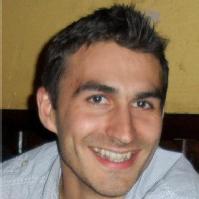WATE 2018 winner: Russ Kitson (Chemistry)
Why did you start teaching? What (or who) inspired you?
Various enthusiastic teachers from school, Sixth Form College and universities. Contagious enthusiasm transforms the learning experience!
I started teaching because I found it an extremely rewarding aspect of my postdoctoral role and had really enjoyed the lab demonstrating and outreach opportunities I had whilst a PhD student.
What pearls of wisdom have you been given over the years that have helped you with your teaching?
Try to relate to the students, be enthusiastic about the topic and try to treat them as an individual. Everyone has bags of potential and may just lack some confidence.
Is there anything you wish someone had told you when you started out?
Slow the pace of the lectures from a research talk. It was quite apparent after my first teaching lecture.
If you were mentoring a first-time teacher, what three bits of advice would you give?
Carefully consider the pace of your teaching lectures. Prepare thoroughly for your teaching sessions. Don’t be afraid to admit that there is something you don’t know the answer to - be honest and suggest you find out together.
What advice/top tips would you give to more experienced teachers?
Don’t get complacent (or arrogant) and assume that the best way to teach is the way you’ve always done it. Be open to trying new ideas and methods and realise that students may learn differently to how they might have done decades ago.
What new technologies are you currently using to enhance your teaching? What are your top tips for using them?
Clickers/polling apps. Stick with the apps- everyone has a smart phone these days and you won’t lose >20% of your expensive clickers each year.
Molecular modelling kits - not exactly new technology, but new in the way it is being used in lectures, workshops and tutorials.
What new or future teaching innovations are you looking forward to?
Augmented reality and virtual reality. It would be very interesting to study how effective it is for teaching concepts in 3D for which I currently use model kits.
What does winning a WATE award mean to you?
It means a huge amount to be recognised for my teaching by both my students and colleagues. I hope it will convince some of the more sceptical colleagues within my department that there is a place for teaching-focussed staff and education-based research. It feels like some reward for a lot of hard work and long hours over the past few years.
What do you enjoy the most about teaching? What’s the best part of your job?
Working with the students is by far the best bit of my job. It is a privilege and a pleasure to see that moment when ideas and concepts start to make sense to them. You can actually see it in their faces!
What are the biggest challenges faced by teaching staff? How do you overcome these?
Parity of esteem for teaching with research; especially with the rather unhelpfully ambiguous term research-led teaching being interpreted to mean either ‘research comes before teaching so it is a higher priority’ or ‘my niche research should heavily influence what we teach’.
This can be overcome through continual review of the promotion criteria. So far, considerable progress has been made, but it still appears easier and quicker to get promoted on other pathways, so there’s still work to be done.
What lessons have you learned from your students?
That getting them to relate concepts to each other can be a very effective way to promote learning.
That they can require very different approaches to teaching and that we should be open and adaptable in view of this.
If you could write a recipe for the perfect inspiring teacher, what ingredients would you need?
- Enthusiasm
- Compassion
- Reliability
- Honesty
- Adaptability
- Approachability and friendliness, but without being afraid to be firm when necessary
- Relatability
- Creativity
Enjoyed hearing from Russ? See the full list of 2018 winners and read other interviews.

